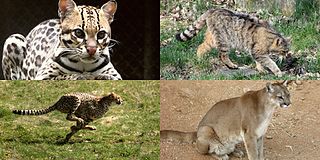
Entomology is the scientific study of insects, a branch of zoology. In the past the term insect was less specific, and historically the definition of entomology would also include the study of animals in other arthropod groups, such as arachnids, myriapods, and crustaceans. This wider meaning may still be encountered in informal use.

Felinae is a subfamily of the Felidae and comprises the small cats having a bony hyoid, because of which they are able to purr but not roar. Other authors have proposed an alternative definition for this subfamily, as comprising only the living conical-toothed cat genera with two tribes, the Felini and Pantherini, and excluding the extinct sabre-toothed Machairodontinae.
Émile Dottrens was a Swiss zoologist and nature conservationist. He became a scientific assistant for zoology at the Natural History Museum of Geneva in 1942 and was the director of that museum from 1953 to 1969. He wrote several articles about the Swiss freshwater fish species from the genus Coregonus. He has worked for the IUCN, for the Swiss nature conservation organisation Pro Natura and at the Council of Europe. He was the president of the International Commission for the Protection of the Alps (CIPRA) from 1960 to 1968. In addition he was a member of the Swiss Academy of Sciences and the Société de Physique et d'Histoire Naturelle de Genève.

The Natural History Museum of Geneva is a natural history museum in Geneva, Switzerland.
Victor Fayod was a Swiss mycologist who created an influential novel classification of the agaric fungi and described a number of new genera and species.

The Cantonal Museum of Zoology in Lausanne has been merged and, as of 1 January 2023, became a department of the Naturéum, a Swiss museum dedicated to the natural sciences. The zoological department is located in the Palais de Rumine, Lausanne, Switzerland.

Pierre du Bois de Dunilac was a Swiss historian, whose research primarily addressed issues of European and Swiss history and politics. His work had a strong focus on analysing current affairs in a global context and on the role of history in shaping present-day political decision-making.

Emil Hassler was a Swiss physician, ethnographer, naturalist and botanist well known for his collections and contributions to the description of the flora and culture of Paraguay.
Pierre Revilliod (1883–1954) was a Swiss naturalist.
Jean Roux was a Swiss herpetologist.

Histopona is a genus of funnel weavers first described as a sub-genus of Hadites by Tamerlan Thorell in 1870. It was elevated to genus by Brignoli in 1972.

Colilodion schulzi is a species of beetles belonging to the family Staphylinidae. This small, robust, reddish-brown rove beetle is known from a single specimen, a 2.37 millimetres (0.093 in) long female. It resembles the species C. concinnus and C. inopinatus with its enlarged antennomeres III, but it is easily distinguished by the greater maximum width and less variable width of these appendages, and by other morphological characteristics. Although its ecology is unknown, the presence of trichomes and the knowledge of related species, such as Staphylinidae suggests that this insect is myrmecophilous. The holotype was collected in 2009 in Palawan (Philippines) while sifting plant debris in a coniferous forest. The species was described in 2016 by the coleopterists Zi-Wei Yin from Shanghai Normal University and Giulio Cuccodoro from the Natural History Museum of Geneva, where the type specimen is part of the collection. The taxon's specific denomination is dedicated to the German myrmecologist Andreas Schulz, collector of the specimen.
Berlandia is a genus of East African huntsman spiders that was first described by R. de Lessert in 1921. As of September 2019 it contains two species, found in Africa: B. longipes and B. tenebricola.
Friedrich Ferdinand Christian Peus or Fritz Peus was a German entomologist who specialised in Coleoptera, Diptera and Siphonaptera. He was a specialist on the fleas.

Paraivongius is a genus of leaf beetles in the subfamily Eumolpinae. It is distributed in Africa.

Microsyagrus is a genus of leaf beetles in the subfamily Eumolpinae. It is known from Africa. Many of the species were formerly placed in Syagrus.

Auguste Louis Brot was a Swiss malacologist (conchologist).

Henri-Charles-Louis Blanc was a Swiss zoologist at the University of Lausanne. He took an interest in aquatic animals, describing numerous species from Lake Geneva. He was also curator of the natural history museum in Lausanne.

Chitaura indica is a species of grasshopper found in South India. It was described by Boris Uvarov in 1929 based on specimens collected from Siddapura in the Karnataka part of the Western Ghats. Despite his original paper introduction mentioning that the holotype of this species along with nine other described by him in the paper was deposited in Natural History Museum of Geneva collections, it was the paratype that was actually deposited in the Geneva collections.













